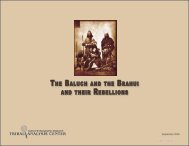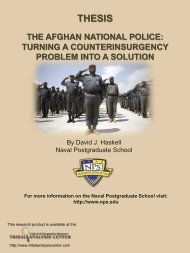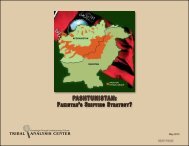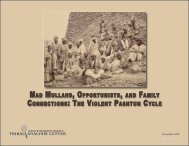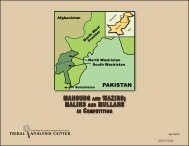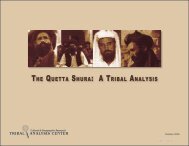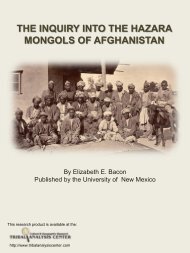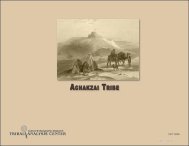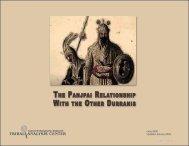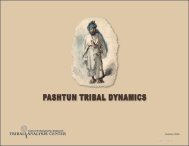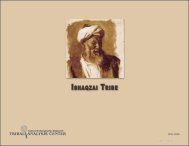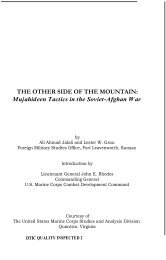Hindustani Fanatics, India’s Pashtuns, <strong>and</strong> Deob<strong>and</strong>ism – Connectionsto re-build their houses, <strong>and</strong> made arrangements with the Amazais for supplies. In the meantime, Maulvi Abdalla in person visited the Akhund, <strong>and</strong>found means to turn away his anger, for Mirja Khan was recalled, <strong>and</strong> permission given to the Hindustanis to re-settle in Buner. The greater portionof them returned to Bajkatta, but had not been there very long before the intrigues of their leaders again brought them into trouble. Maulvi Abdallawas induced to join a league that had been formed by Azim Khan <strong>and</strong> other Buner chiefs, together with the Amazai <strong>and</strong> Mukarrab Khan, chief of theKhudu Khel, to oppose the influence of the Akhund, <strong>and</strong> obtain for Mukarrab Khan recovery of his former possessions <strong>and</strong> reinstatement at Panjtar.Mukarrab Khan – who, after his expulsion from the Totalai villages <strong>and</strong> the destruction of Panjtar <strong>and</strong> Mangal Thana in 1858 by our troops, had comein to the Commissioner of Peshawar, <strong>and</strong> been allowed to reside in British territory, was the prime mover in this plot, by which he sought to regain hisformer possession; his money cemented the various alliances, <strong>and</strong> purchased the neutrality of some of the Buner chiefs. On the 2 nd of August, ZaidullaKhan committed the first overt act of hostility by seizing a number of Swat traders passing through his l<strong>and</strong>s. The Akhund immediately mustered hisfollowers, <strong>and</strong> directed the Buner tribes to break up the league by expelling the Hindustanis <strong>and</strong> putting to death the refractory chiefs. In pursuanceof his orders, Zaidulla Khan was treacherously assassinated in his own house. On the 12 th August they arrived, together with the Akhund’s followers,before Bajkatta, <strong>and</strong> sent a message to the Maulvi, giving him one day to remove all his followers, women, <strong>and</strong> children.The <strong>fanatics</strong> at first thought of resistance, <strong>and</strong> exchanged a few shots with the Salarzais, but were induced by Azim Khan to give in <strong>and</strong>commence preparations for a retreat. The next day the whole body evacuated Bajkatta, the women <strong>and</strong> children being sent on ahead, <strong>and</strong> the rearbrought up by a guard of fifty or sixty men armed with rifles. For the first few miles all went well; the Buner men being occupied in plundering <strong>and</strong>burning the deserted settlement; but as the fugitives neared the pass between Bajkatta <strong>and</strong> Batora they saw that the hills on both sides were held by theAkhund’s followers. The mass of fugitives, including Mauvli Abdalla, Azim Khan, <strong>and</strong> the Buner chiefs, pushed on through the pass, <strong>and</strong> made theirescape with slight loss, but the rear guard was cut off, <strong>and</strong> after a gallant st<strong>and</strong>, entirely destroyed. From Batora the fugitives fled to Gulima Bori, inChagarzai territory; here they obtained a short respite, <strong>and</strong> even conceived hopes of being able to establish themselves permanently, being promisedsupport, in the event of an attack, by the Amazais <strong>and</strong> one section of the Chagarzais.The power of the Akhund, increased by his complete triumph over the rival faction in Buner, was, however, too great for them. The Chagarzais,in obedience to his orders, expelled the <strong>fanatics</strong>, who continued their flight through Tangor to Bihar, on the right bank of the Indus, where they arrivedabout the 18 th of September with some twenty or thirty wounded men. Later accounts of them are very conflicting, but it is certain that the Maulvi, withsome hundreds of followers, came over to Judha, <strong>and</strong> that many of them remained there till the British force arrived on the crest of Black Mountain in1868. The <strong>fanatics</strong> were welcomed <strong>and</strong> given the grant of a hamlet in Judha, <strong>and</strong> were enabled to purchase several rafts, thus getting comm<strong>and</strong> of theriver, <strong>and</strong> making themselves independent of the extortionate Pathan ferrymen whilst at Judha. The Maulvi received letters in 1868, it is said, fromthe Tikari chief, who offered to give the whole body of fugitives an asylum in his fort, <strong>and</strong> l<strong>and</strong> in the Tikari valley, <strong>and</strong> also from the Allai jirga <strong>and</strong>the chief of Thakot, who promised to come to Judha to hold a great council <strong>and</strong> discuss measures of resistance against the British. Mubarak Shah wasalso summoned, <strong>and</strong> the war party, cis-Indus, was daily increasing. It seems probable that, a month later, the force under Major-General Wilde wouldhave found a powerful coalition <strong>and</strong> some organized plan of defense, but our rapid approach disconcerting them, the <strong>fanatics</strong> hastily re-crossed theriver, deserting their Chagarzai hosts, thereby departing from their profession as soldiers of the faith, <strong>and</strong> destroying the last remnant of their formerprestige, already injured by the treatment they had met with at the h<strong>and</strong>s of the Akhund <strong>and</strong> his disciples. The main body of them then went to Palosi,a village of the trans-Indus Hassanzais, who refused, however, to allow them a permanent settlement. From Palosi, they went to Thakot, but findingno resting-place there, moved down the river to Bihar <strong>and</strong> Judha of the Chagarzais; <strong>and</strong> being obliged to ab<strong>and</strong>on this refuge also, they at last threwTribal Analysis Center, 6610-M Mooretown Road, Box 159. Williamsburg, VA, 23188
Hindustani Fanatics, India’s Pashtuns, <strong>and</strong> Deob<strong>and</strong>ism – Connectionsthemselves on the mercy of the Hassanzais. Here they received some l<strong>and</strong> called Maidan near the village of Palosi, which is on the right bank of theIndus, about fifteen miles from Darb<strong>and</strong>. At Maidan they erected buildings surrounded by a mud wall <strong>and</strong> flanked by towers, forming a kind of fort,<strong>and</strong> here the colony, numbering 600 to 700, lived under their aged chief Maulvi Abdulla, paying to the Hassanzais some Rs. 800 a year as rent fortheir l<strong>and</strong>s, gardens, <strong>and</strong> buildings.During the Buner complications in 1885 the Hindustani colony was not actually hostile, but their missionaries were very active, <strong>and</strong> it isprobable that, had an expedition been sent into Buner, they would have joined the Bunderwals against the Government, <strong>and</strong> as a fact they made theprobability of such an expedition a reason for asking for contributions from their supporters throughout India.In May 1885, Maulvi Abdulla sent a letter to the Deputy Commissioner of Hazara, complaining that there was a debt due the colony of Rs.8000 from two men residing in British territory, <strong>and</strong> requesting that the claims might be settled by the Government, <strong>and</strong> threatening that, if this werenot done, reprisals would be undertaken. It appeared on enquiry that there was no ground for this claim, <strong>and</strong> the Commissioner was directed, if heconsidered it necessary to reply at all to the Maulvi’s communications, to inform him that letters accompanied by threats could not be attended to.In the complications with the Black Mountain tribes which immediately preceded the dispatched the expedition of 1888, the aged MaulviAbdulla with 120 Hindustanis from Maidan joined the Hassanzais on the crest of the Black Mountain <strong>and</strong> in making demonstrations against Britishterritory.In July, orders were issued for the colony of <strong>fanatics</strong> to be included in the blockade of the Black Mountain tribes. When it was rumoredthat an expedition was to be sent to punish those tribes, Mullah Abdalla held back as far as his profession would allow; <strong>and</strong> if he did not actuallycounsel submission, he did not encourage opposition, knowing that the brunt of fighting would fall upon his followers, that the result was a foregoneconclusion, <strong>and</strong> that to st<strong>and</strong> up <strong>and</strong> fight meant annihilation. He judged more correctly than the tribesmen that they could not fight against breechloaders,that the river could be crossed, <strong>and</strong> roads blasted out of the rocks where even the country traders’ mules could not pass. When the hour oftrial came, only some one hundred of his b<strong>and</strong>, joined by a few score of <strong>fanatics</strong> from among our own subjects <strong>and</strong> neighboring clans, tempted fateat Kotakai <strong>and</strong> charged sword in h<strong>and</strong> to be mown down like grass. Of the 88 dead counted on the spot where the Ghazi rush was made during theaction of Kotkai on the 4 th October 1888, only 48 were identified as Hindustanis. Maulvi Abdulla <strong>and</strong> the main body watched events from the furtherbank of the Indus, a sad falling off from their profession of the faith, <strong>and</strong> one which had the effect of lowering still more their prestige <strong>and</strong> fame.Nine days later a force was crossed over to the right bank of the Indus, <strong>and</strong> after blowing up its principal bastions, burned the Hindustani fort<strong>and</strong> settlement of Maidan to the ground, without a blow being struck in its defence.Subsequent to the Hazara expedition of 1888, Maulvi Abdalla <strong>and</strong> his following, still numbering some 600, took up their quarters nearKabalgram among the Chagarzai <strong>and</strong> Akhund Khel of the Indus valley, <strong>and</strong> they were located there when the hazara expedition of 1891 took place.Although they were bound by the exigencies of their peculiar position as a b<strong>and</strong> of “irreconcilables” settled among foreigners to take the lead againin opposing our troops, they did not dare another open attack by daylight, but resorted to an attempt to affect a night surprise. On the morning of the19 th March 1891, about 100 Hindustanis, backed up by some fifty of the more adventurous spirits among the Chagarzai <strong>and</strong> other clans, made a mostTribal Analysis Center, 6610-M Mooretown Road, Box 159. Williamsburg, VA, 23188
- Page 7 and 8: Hindustani Fanatics, India’s Pash
- Page 9 and 10: Hindustani Fanatics, India’s Pash
- Page 11 and 12: Hindustani Fanatics, India’s Pash
- Page 13 and 14: Hindustani Fanatics, India’s Pash
- Page 15 and 16: And Charles Allen described the sce
- Page 17 and 18: Hindustani Fanatics, India’s Pash
- Page 19 and 20: Charles Allen provided additional d
- Page 21 and 22: Hindustani Fanatics, India’s Pash
- Page 23 and 24: Hindustani Fanatics, India’s Pash
- Page 25 and 26: Hindustani Fanatics, India’s Pash
- Page 27 and 28: Hindustani Fanatics, India’s Pash
- Page 29 and 30: that Shah Waliullah’s ancestors w
- Page 32: Hindustani Fanatics, India’s Pash
- Page 35 and 36: Hindustani Fanatics, India’s Pash
- Page 37 and 38: Hindustani Fanatics, India’s Pash
- Page 39: Hindustani Fanatics, India’s Pash
- Page 42 and 43: Hindustani Fanatics, India’s Pash
- Page 46 and 47: Hindustani Fanatics, India’s Pash
- Page 48 and 49: Hindustani Fanatics, India’s Pash
- Page 50 and 51: Hindustani Fanatics, India’s Pash
- Page 52 and 53: Hindustani Fanatics, India’s Pash
- Page 54 and 55: Hindustani Fanatics, India’s Pash



